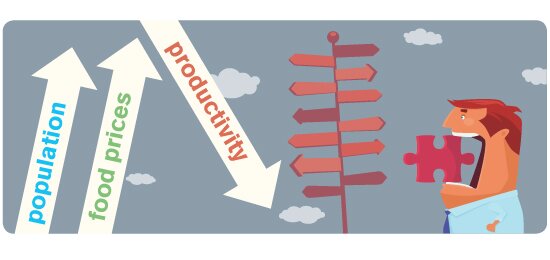
Agriculture is not what it used to be, it grew-up; it became more efficient, increasingly precise and productive, and employs a diversity of technological solutions. So things are looking good for the future of food production, right?
Agriculture develops and adapts to feed us; there’s a lot more of us than there used to be, and plenty more on the way. World population between 1960 and the year 2000; in just 40 years 3 billion become 6 billion. Although population growth is slowing, we can expect to be sharing the planet with 9 billion people by the year 2050.
If feeding all of these extra mouths is not challenge enough, modern day farmers also have to struggle with climate change and the unpredictable and extreme weather events that accompany it, a volatile economy and the impact of global recession and austerity measures. It is worth pointing out that this is against the backdrop of a European agricultural production index that currently shows a trend; and less than favourable conditions to support essential innovation in agricultural technologies, as research and development costs spiral. Farmers are also increasingly seen as ‘stewards of the land’, meeting with public concern over the fate of the environment, the sustainable use of natural resources, and the preservation of rural tradition and landscape aesthetics. But it wasn’t always this way.

Agriculture – the act of cultivation – has several thousand years of history and was once an activity that more-or-less involved the entire community. Thanks to historical developments in agriculture, agricultural technology and the continued dedication of farmers, we don’t all need to farm anymore; society has grown; getting enough food no longer requires all of us to be out in the fields.
The Green Revolution and the last few decades have seen society become increasingly disconnected from agriculture and sometimes shockingly unaware of where their food comes from. As we’ve become less aware of the ways and means of food production, we’ve paradoxically developed interest in the relationship between food and health, and the impact of farming on the environment.
As a society we’ve grown to ask a lot from farmers. We want agriculture to provide safe, healthy and affordable food, and we want food production to have as little impact on the natural environment as possible. These are sensible demands, considering the nutritional requirements of a growing population and the need for increased sustainable productivity. However, our disconnect from the realities of agriculture risks that we fail to make the right choices when deciding on the future of farming – making life difficult for farmers today, and more complicated for the rest of us in the future.
Rising global demand for food, the need to conserve natural resources, the challenges of a changing climate and a decline in biodiversity and ecosystem services all underline the need to take agriculture seriously and ensure that agricultural policy is pragmatic and evidence based. We can’t afford to make the wrong decisions.
Farmers need the support of agricultural policy that encourages sustainable productive agriculture. European society, environment, and economic competitiveness will all benefit if farmers have the tools they need to do the job we ask of them. For this, we need a regulatory framework that understands the realities of agriculture, and looks for solutions in the fostering of innovation, and the appliance of sound science and proven best management practices.
Agriculture is, and will continue to be, a driver of change; with or without positive intervention. We have to eat, therefore we grow. What, where, and how we grow, are key considerations for sustainable agriculture; and as society becomes increasingly involved and influential in the sustainability debate, it will pay us (and the 2 billion new arrivals we expect in the next few decades) to understand farming a little better, to reconnect with agriculture, and avoid biting the hand that feeds us.
